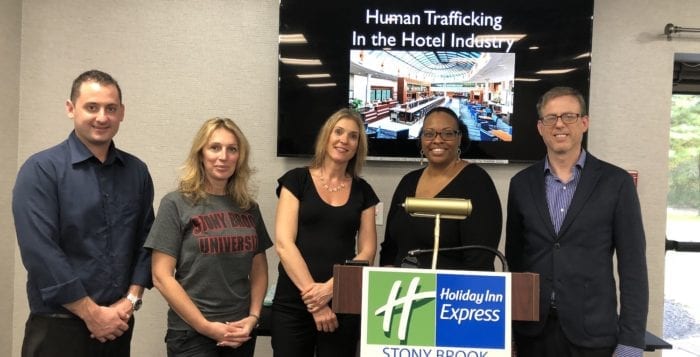Hotel partners with nonprofits to educate employees about human trafficking

A Stony Brook hotel is doing its part to help stop sex trafficking on Long Island.
“They’re the ones walking the halls all day long so if they see something out of place, they can let us know.”
— Charlie Ziegler
The Holiday Inn Express Stony Brook says it is the first hotel on Long Island to offer an employee seminar on how to spot victims of human trafficking. John Tsunis, the hotel’s owner, invited representatives from Long Island Against Trafficking, a nonprofit dedicated to creating awareness about trafficking, and Victims Information Bureau of Suffolk, which assists survivors of violence, to conduct the hour-long seminar earlier this month for all of their housekeeping and management staff.
Charlie Ziegler, director of operations at Holiday Inn Express, said while the hotel has never encountered a problem, Tsunis and its management felt the information would be invaluable to employees.
“They’re the ones walking the halls all day long so if they see something out of place, they can let us know,” Ziegler said, adding calling the authorities would be the next step.
Sue Lingenfelter, a board member of Long Island Against Trafficking, presented the idea to Tsunis at a networking event back in September, and he quickly said “yes” to the nonprofit coming in to make a presentation.
The goal of the seminar is to train staff members on how to identify victims of human sex trafficking, according to Lingenfelter, where a person is forced against their will to engage in sexual activity, and what to do if they suspect it — a crime she said that occurs often in hotels.
Both Lingenfelter and her fellow board member Shantae Rodriguez said there are a number of red flags to look out for that include: a person allowing someone else to do the talking for them; a hotel guest refusing housekeeping services but ordering more towels and linens than average; a distressed young woman with an older man; or a group of women with one man.
“You can be in the hallway, notice there was a man inside and he came out and saw another man go in, come out.”
— Sue Lingenfelter
LIAT members said sometimes a hotel guest may not want to give a full name, register a vehicle, or will ask for a room toward the back of the hotel which makes it easier for multiple people to come and go. Lingenfelter added seeing a lot of people coming and going from one hotel room is a red flag.
“You can be in the hallway, notice there was a man inside and he came out and saw another man go in, come out,” she said. “These are the signs [employees] can potentially notice. Every employee in the hotel would have a different view of things that could show that this person is being trafficked.”
Rodriguez said if someone gets a chance to talk to a suspected victim, they may find out the person doesn’t know what day it is or what town they are in due to being moved from one location to another constantly by the trafficker.
Both board members and Ziegler felt the seminar was well received and Rodriquez said many employees asked questions.
“The fact that they’re asking questions shows that they’re engaging, and it did turn some wheels, or maybe there is something they’re looking out for,” she said.
Lingenfelter and Rodriguez said they are hoping to bring the seminar to more hotels on Long Island.
“The more education, the more seminars, the more training a hotel is willing to receive, the more that they’re able to say they’re taking a stand against this injustice and being a part of the healing of ending trafficking in this particular area,” Rodriguez said.
Ziegler said if new employees are added to the Holiday Inn Express staff or it is felt a refresher is needed, they would definitely schedule another seminar, and he said he recommends it for all hotels.
“Even if you feel you don’t have this issue going on at all, for every hotel I would absolutely do a seminar,” he said. “It only takes an hour out of everyone’s time. If it can save one victim anywhere it’s worth it.”






